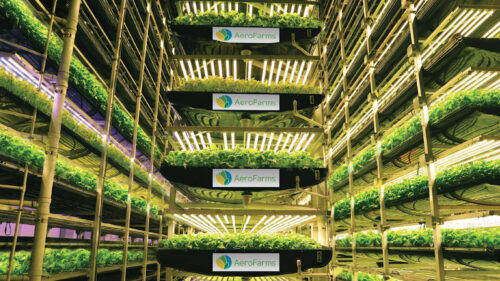Join Health Affairs for a virtual conversation between me and Angela Odoms-Young of Cornell University discussing the evolution of US food and nutrition policy, the current policy landscape, and thoughts on what lies ahead. It’s at 1:00 p.m. EDT. To join the Webinar, register here.
RIP Aero Farms: it just went bankrupt
I, for one, am not surprised, but am also not rejoicing. Aero Farms has just filed for bankruptcy.
I thought Aero Farms was a valiant experiment in vertical leafy green farming run by some very smart people.
Pre-pandemic, I visited their factory in Newark, New Jersey, a couple of times and fjound the place impressive in concept, size, and production.

The photo can’t show how enormous this factory is, with rows of cloth-covered trays stacked to the high ceiling. The company planted the greens on cloth and sprayed nutrients on the roots growing through the cloth. The greens were clean, free of pathogenic bacteria, and surprisingly tasty. They grew several different kinds, all with distinctive flavors. All were tested to demonstrate their excellent nutritional value.
They sold the greens to a variety of local restaurants and institutions.
But I am not surprised by their going bankrupt.
I am currently working on an updated edition of What to Eat, in which I discuss food issues, one of them vertical farming. From my research, I can tell you:
- The kinds of plants that can be grown in vertical farms are limited to those that need relatively low light (e.g. lettuce); even the best LED lights are not strong enough for more profitable vegetables.
- Lettuce from California costs half as much to produce as lettuce from East Cost vertical farms.
- The Achilles heel of indoor farming is the cost of all those lights. Energy from the sun is free. Electricity from the grid is anything but.
- AeroFarms reported $35 million in losses in 2021, but predicted profitability by 2024.
Vertical farming is in trouble unless it can solve the light problem.
Was it worth a try? That’s for you to decide.
In the meantime, Aero Farms is keeping its Danville, California plant open and remaining optimistic that it can continue to brink in venture capital.
Industry reactions to the news are also not surprising. Those who follow vertical farming knew this was coming.
I’m truly sorry for this experiment failed.

